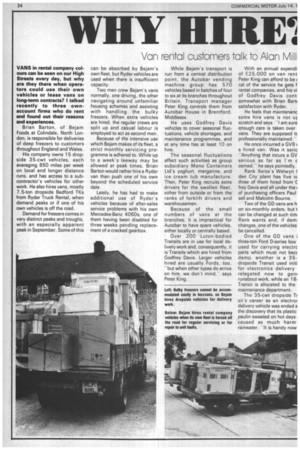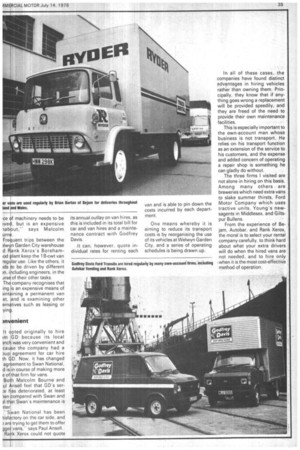WHY HIRE:
Page 36

Page 37

If you've noticed an error in this article please click here to report it so we can fix it.
Van rental customers talk to Alan Mill
VANS in rental company colours can be seen on our High Streets every day, but why are they there when operators could use their own vehicles or lease vans on long-term contracts? I talked recently to three ownaccount firms who do rent and found out their reasons and experiences.
Brian Barton, of Bejam Foods at Colindale, North London, is responsible for deliveries of deep freezers to customers throughout England and Wales.
His company owns 15 dropside 35-cwt vehicles, each averaging 850 miles per week on local and longer distance runs, and has access to a subcontractor's vehicles for other work. He also hires vans, mostly 7.5-ton dropside Bedford TKs from Ryder Truck Rental, when demand peaks or if one of his own vehicles is off the road.
Demand for freezers comes in very distinct peaks and troughs, with an especially apparent peak in September. Some of this can be absorbed by Bejam's own fleet, but Ryder vehicles are used when there is insufficient capacity.
Two men crew Bejam's vans normally, one driving, the other navigating around unfamiliar housing schemes and assisting with handling the bulky freezers. When extra vehicles are hired, the regular crews are split up and casual labour is employed to act as second men.
Because of the intensive use which Bejam makes of its fleet, a strict monthly servicing programme is adhered to. While up to a week's leeway may be allowed at peak times, Brian Barton would rather hire a Ryder van than push one of his own beyond the scheduled service date.
Lately, he has had to make additional use of Ryder's vehicles because of after-sales service problems with his own Mercedes-Benz 406Ds, one of them having been disabled for three weeks pending replacement of a cracked gearbox. While Bejam's transport is run from a central distribution point, the Autobar vending machine group has 570 vehicles based in batches of four to six at its branches throughout Britain. Transport manager Peter King controls them from Autobar House in Brentford. Middlesex.
He uses Godfrey Davis vehicles to cover seasonal fluctuations, vehicle shortages, and maintenance programmes, and at any time has at least 10 on hire.
The seasonal fluctuations affect such activities as group subsidiary Mono Containers Ltd's yoghurt, margarine, and ice cream tub manufacture. Then, Peter King recruits extra drivers for the swollen fleet, either from outside or from the ranks of forklift drivers and warehousemen.
Because of the small numbers of vans at the branches, it is impractical for Autobar to have spare vehicles, either locally or centrally based.
Over 200 Luton-bodied Transits are in use for local delivery work and, consequently, it is Transits which are hired from Godfrey Davis. Larger vehicles hired are usually Fords, too, "but when other types do arrive on hire, we don't mind," says Peter King. With an annual expendi of f_25,000 on van rent Peter King can afford to be cal of the service he gets f rental companies, and his vi of Godfrey Davis cont somewhat with Brian Bart( satisfaction with Ryder.
He feels that maintenanc some hire vans is not ur scratch and says 'I am sure enough care is taken over vans. They are supposed tc professionally maintained."
He once incurred a GV9 N a hired van. Was it serio "Anything that incurs a GV serious as far as I'm c cerned,'' he says pointedly.
Rank Xerox's Welwyn ( den City plant has five vr three of them hired from C frey Davis and all under the r of purchasing officers Paul sell and Malcolm Bourne.
Two of the GD vans are h on six-monthly orders, but t can be changed at such timi Rank wants and, if dem; changes, one of the vehicles be cancelled.
One of the GD vans i three-ton Ford D-series box used for carrying electrc parts which must not becc damp, another is a 35-. dropside Transit used initi for electronics delivery relegated now to gem runabout work, while an 18Transit is allocated to the maintenance department.
The 35-cwt dropside Tr sit's career as an electror delivery vehicle was ended a the discovery that its plastic paulin sweated on hot days ; 'caused as much harm rainwater. "It is handy now
Ce f machinery needs to be ive , but is an expensive ab ut,— says Malcolm urn Fre uent trips between the :lw n Garden City warehouse ank Xerox's Boreham,od lam keep the 1 8-cwt van -eg lar use. Like the others, it ids o be driven by different cluding engineers, in the J rS of their other tasks.
Th company recognises that ing is an expensive means of iint ining a permanent van et, nd is examining other ern tives such as leasing or yin
)n enient
It ipted originally to hire rn GD because its local Inc was very convenient and cau e the company had a Dup agreement for car hire th C D. Now, it has changed agr ement to Swan National, d is in course of making more o of that firm for vans.
Bo h Malcolm Bourne and
ul nsell feel that GD's ser
e as deteriorated, at least len ompa red with Swan and t at Swan's maintenance is tter
—S an National has been tisf ctory on the car side, and 3ard trying to get them to offer gge • vans, says Paul Ansell. Rank Xerox could not quote
its annual outlay on van hires, as this is included in its total bill for car and van hires and a maintenance contract with Godfrey Davis.
It can, however, quote individual rates for renting each van and is able to pin down the costs incurred by each department.
One means whereby it is aiming to reduce its transport costs is by reorganising the use of its vehicles at Welwyn Garden City,, and a series of operating schedules is being drawn up. In all of these cases, the companies have found distinct advantages in hiring vehicles rather than owning them. Principally, they know that if anything goes wrong a replacement will be provided speedily, and they are freed of the need to provide their own maintenance facilities.
This is especially important to the own-account man whose business is not transport. He relies on his transport function as an extension of the service to his customers, and the expense and added concern of operating a repair shop is something he can gladly do without.
The three firms I visited are not alone in hiring on this basis_ Among many others are breweries which need extra vans to slake summer thirsts, Ford Motor Company which uses tractive units, Young's newsagents in Middlesex, and Giltspur Bullens.
From the experience of Bejam. Autobar. and Rank Xerox, the moral is to select your rental company carefully, to think hard about what your extra drivers will do when the hired vans are not needed, and to hire only , when it is the most cost-effective method of operation.








































































































































